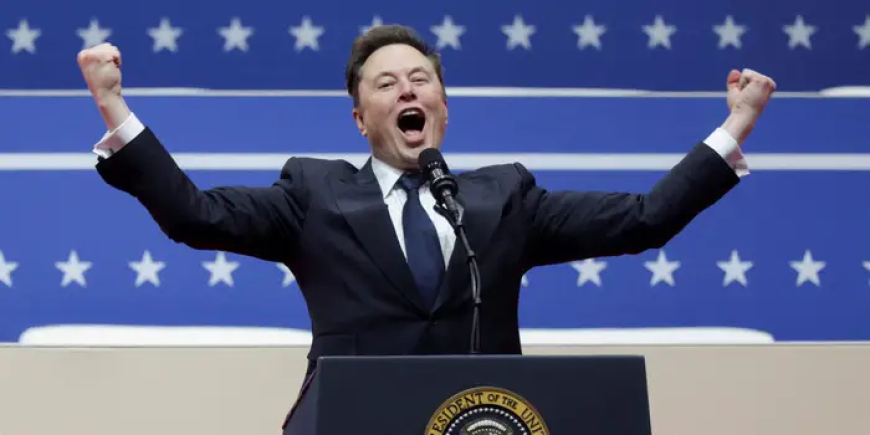Elon Musk Enters U.S. Politics with 'America Party,' Sparking Clash with President Trump Over Tesla & SpaceX Subsidies
Elon Musk launches the America Party, challenging President Trump’s economic policies. Trump retaliates with threats to cut Tesla and SpaceX contracts.

Tech billionaire Elon Musk has made a stunning foray into U.S. politics with the launch of a new political platform: the “America Party.” Positioning himself as an independent reformer, Musk used the launch to critique President Donald Trump’s economic policies, calling them “shortsighted,” “protectionist,” and “a threat to U.S. innovation.”
The move has already triggered a fierce backlash. In a fiery social media post, President Trump threatened to pull federal subsidies and cancel billions in government contracts awarded to Musk’s companies—Tesla and SpaceX—if the entrepreneur “continues down this reckless path.”
This political escalation not only raises constitutional and ethical questions, but also signals a new power struggle at the intersection of business, technology, and governance in America.
Elon Musk’s ‘America Party’: A Technocrat’s Vision
At a nationally televised press conference held in Austin, Texas, Musk described the America Party as a “movement built on facts, science, and economic freedom.”
“We need a future-forward, data-driven vision for America,” Musk stated. “Not 1950s-style isolationism. Not the weaponization of tariffs.”
According to the party’s launch website (AmericaParty.org — a domain registered last month), its platform includes:
-
Ending corporate subsidies for fossil fuels
-
Adopting AI and automation to streamline government
-
Launching a universal carbon dividend
-
Promoting global scientific collaboration over trade wars
-
Reforming tax incentives to promote entrepreneurship and space innovation
While Musk did not announce a presidential run, political insiders suggest the party could back candidates across the ideological spectrum in 2026 and 2028 elections.
According to a Politico report, key Silicon Valley donors and former independent voters have already expressed interest in funding the movement.
Trump's Counterattack: Subsidy Threats and Contract Warnings
President Trump, known for his blunt and combative political style, responded within hours on Truth Social, accusing Musk of “biting the hand that feeds him.” He threatened to review:
-
Federal EV subsidies awarded to Tesla under the Inflation Reduction Act
-
NASA contracts awarded to SpaceX, including those tied to the Artemis Moon missions
-
Department of Defense launch contracts worth an estimated $2.7 billion
“No one is bigger than America. You launch your little party, you lose your taxpayer cash,” Trump wrote in his post, adding, “Tesla and SpaceX should be very nervous.”
This raises potential conflict-of-interest and First Amendment issues, according to legal scholars. A Brookings Institution commentary argues that government retaliation against political expression—even from business leaders—could cross into unconstitutional territory.
Economic and Market Reactions
Markets responded with uncertainty. Tesla shares fell by 3.4%, while SpaceX’s valuation—still private but closely watched—was reportedly impacted by the risk of contract withdrawal. Meanwhile, traders viewed the feud as a new variable in an already volatile economic landscape defined by trade tensions and regulatory uncertainty.
Financial analysts at Morgan Stanley warned in a briefing note that if Trump follows through on threats, Tesla could lose over $7 billion in subsidies by 2027. Additionally, the NASA-SpaceX partnership, critical for U.S. leadership in space exploration, may face disruption.
“We are seeing a very dangerous precedent—weaponizing federal policy for political vendettas,” said Claire Atkinson, senior analyst at Strategic Policy Advisors.
Musk’s Political Timing: Calculated or Reactionary?
Elon Musk has increasingly used his platform on X (formerly Twitter) to weigh in on political and social issues—from opposing DEI policies to criticizing government regulation of AI. But the launch of a formal political party is a step few expected—particularly one openly opposing an incumbent president.
According to The Atlantic, Musk may be seizing a political moment: record-low trust in institutions, a fractured Republican Party, and Democrats struggling to unify behind a clear 2028 message.
A recent Gallup poll indicates that 61% of Americans now favor a “viable third party” to challenge the two-party status quo—the highest number recorded since 2001.
The Legal Landscape: Can Trump Pull Contracts?
Experts warn that Trump’s threats may not hold up under scrutiny. Federal contracts, especially those with NASA or the Department of Energy, are governed by multi-year appropriations and strict performance benchmarks—not political alignment.
“There’s no legal basis to cancel contracts solely because someone criticizes the president,” says Prof. Daniel Hemel, a law scholar at NYU School of Law. “Doing so would violate constitutional protections of free speech and due process.”
However, the appearance of political favoritism—whether in granting or revoking funding—could still influence future bidding, creating a chilling effect on politically active corporations.
SpaceX and Tesla: At Risk or Resilient?
Despite the political risks, both SpaceX and Tesla remain leaders in their industries. SpaceX continues to dominate orbital payload launches, and its Starlink satellite internet program has expanded to 90 countries. Meanwhile, Tesla holds nearly 30% of the U.S. EV market share, according to CleanTechnica.
Yet with billions in federal support on the line, Musk’s political pivot could challenge investor confidence, especially if government support begins to shift toward competitors like Rivian, Blue Origin, or Lockheed Martin.
Conclusion: A Collision of Power and Principle
Elon Musk’s launch of the America Party is more than a celebrity stunt—it’s a strategic political move that could reshape the 2026 midterms and beyond. But it has also sparked one of the most public confrontations between a sitting U.S. president and a corporate titan in recent history.
Whether Musk’s vision of a tech-enabled, centrist political movement gains real traction remains to be seen. What’s certain is that the stakes—for American democracy, for the private sector, and for innovation policy—have never been higher.
As the battle between Musk and Trump unfolds, the outcome may set the tone for how business leaders participate in politics for decades to come.














